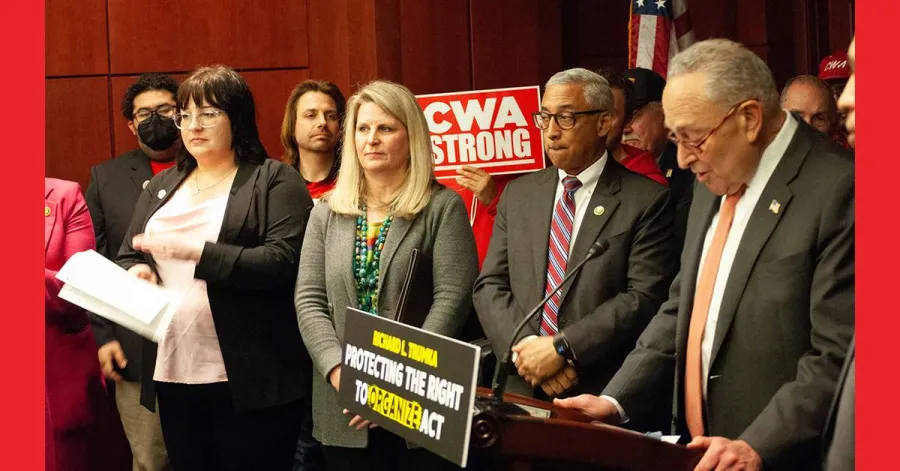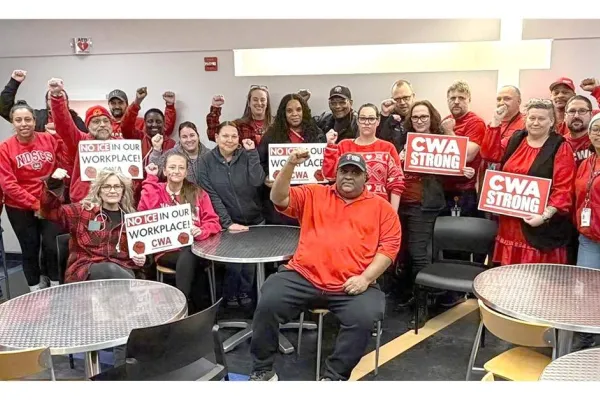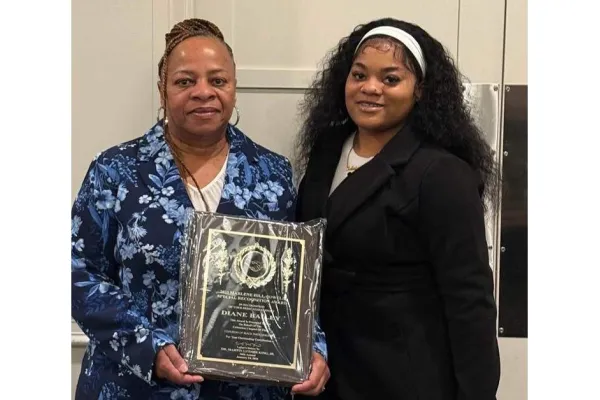Worker Power Update

Protecting the Right to Organize Act
On Tuesday, a bipartisan group of Senators and Members of Congress reintroduced the Protecting the Right to Organize (PRO) Act, which strengthens the right of workers to form a union and negotiate for better pay, benefits, and working conditions. The House bill was introduced by Representatives Bobby Scott (D-Va.) and Brian Fitzpatrick (R-Pa.), and in the Senate by Senator Bernie Sanders (I-Vt.).
During the announcement event at the U.S. Capitol, CWA Member Kirsten Civick, who formed a union with her co-workers at the Apple Penn Square store in Oklahoma City, Okla., discussed the conditions that fueled the workers’ organizing campaign and described Apple’s attempts to prevent them from forming a union.
“Weak labor laws allow companies like Apple to conduct union busting tactics in the hopes of scaring workers from organizing,” Civick said. “The PRO Act would put power back in the hands of workers to make our own decisions about forming a union without the risk of losing our jobs. The bill imposes real penalties for breaking the law because right now, it seems like companies can get away with pretty much anything with little to no consequence. It also bans the mandatory anti-union meetings that we faced.”
Senate Majority Leader Chuck Schumer (D-N.Y.), House Minority Leader Hakeem Jeffries (D-N.Y.), Senator Patty Murray (D-Wash.), and AFL-CIO President Liz Schuler joined Sen. Sanders and Rep. Scott at the event, where they discussed the importance of unions for building a strong middle class and improving the lives of workers and families.
The House of Representatives passed the PRO Act in 2021 in a bipartisan vote, but the bill stalled in the Senate due to the outdated filibuster rule, which requires supermajority support to pass most legislation. Support remains strong for the PRO Act and enacting the bill is a top priority for CWA members.

Senate Majority Leader Chuck Schumer (right) spoke at an event at the U.S. Capitol to reintroduce the Protecting the Right to Organize (PRO) Act. Other speakers in support of the bill included CWA Member Kirsten Civick (left), AFL-CIO President Liz Schuler, and Rep. Bobby Scott.
~~~
###
Colorado CWA Members Speak Out for Protection from Retaliation
On Tuesday, CWA Local 7799 university staff, healthcare workers, public defenders, and library employees joined teachers, firefighters, paramedics, and other public workers to speak out for the Public Employees’ Workplace Protection Act, state legislation that will provide public workers in Colorado with protections against retaliation.
Under current law, many Colorado public employers may discipline and even fire employees who raise concerns to supervisors or colleagues about workplace conditions such as insufficient resources and heavy caseloads. While this bill does not require public employers to collectively bargain with workers, it does provide basic protection against retaliation for workers who try to improve their workplace.
Jade Kelly, President of CWA Local 7799 and staff member at the University of Colorado-Boulder, spoke at the event and wrote in support of the bill, "Public workers are the backbone of Colorado and we are on the front lines of serving our communities. We need to protect our right to organize and collectively speak out if we are going to meaningfully address the issues impacting ourselves as well as our students, patients, clients, and all the people in our state. We need the Public Employees' Workplace Protection Act and so does our community.”

CWA Local 7799 President Jade Kelly spoke out in support of the Public Employees’ Workplace Protection Act, state legislation that will provide public workers in Colorado with protections against retaliation.
###
Engaging Legislators in North Carolina

Earlier this month, members of the CWA North Carolina Legislative and Political Action Team continued to build political power with other unions and community and coalition partners by attending the North Carolina AFL-CIO Legislative Conference in Raleigh, the state capital. They also met with state legislators to discuss key issues facing working people in North Carolina.
CWA District 3 Broadband Brigade Lead Keith Busby (pictured above) gave a presentation about the importance of using federal broadband funding to build high-quality fiber optic networks with union labor. CWA also provided information that was distributed to all 170 members of the state legislature on ways state and local governments can ensure that broadband funding recipients maintain high labor standards and build reliable networks.
###
NLRB Reverses Trump-Era Decision Allowing Bosses to Silence Workers in Exchange for Severance
In 2020, the Republican majority on the National Labor Relations Board (NLRB) ruled that a hospital that was laying off workers in the midst of the COVID-19 pandemic could require them to sign non-disparagement agreements in order to receive severance pay.
Last month, the NLRB reversed that decision noting, correctly, that employers cannot force workers to waive their rights under federal law and that non-disparagement agreements interfere with workers’ ability to engage in collective action to improve working conditions.
This is just the latest in a series of decisions by the NLRB that are helping restore power to workers. Appointments to the NLRB are one of the most direct ways a president can impact the amount of power corporations have over our lives. President Biden’s appointees are working to restore the mandate of the National Labor Relations Act to encourage collective bargaining and protect workers’ freedom to join together for the purpose of negotiating the terms and conditions of their employment.
CWA and Allies File Comments Supporting FCC Oversight of Voice Service in the Internet Age
Legacy T and Activision Members Meet With CWA President Cummings in Minneapolis
CWA Celebrates Dr. Martin Luther King Jr. With the CBTU



